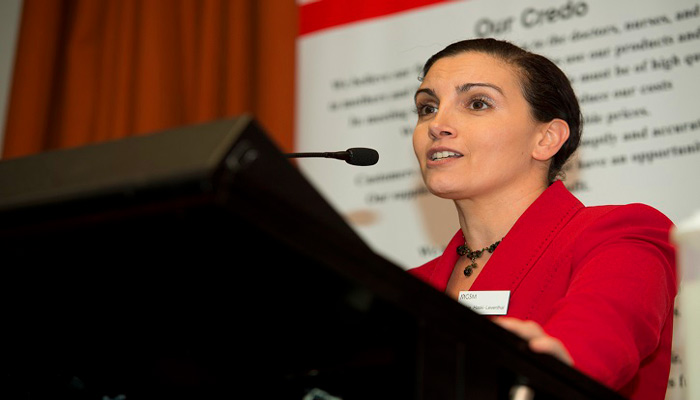What’s the role of business in society? Increasingly, people expect corporations to focus on far more than just maximising the profit they deliver to shareholders, and – as the Banking Royal Commission has revealed – when business doesn’t meet its social obligations, there will be a backlash.
Associate Professor Haski-Leventhal lectures in strategic CSR at the Macquarie Graduate School of Management, and her book explores, through case studies, practical ways that organisations can implement CSR in their own business.
https://lighthouse.mq.edu.au/article/august/helping

Words and action: The Body Shop is famed for its social activism and products which have not been tested on animals.
Management expert Associate Professor Debbie Haski-Leventhal has spent years exploring the thorny question of how business can meet its responsibility to the community. Her new book outlines the history and theories of the corporate social responsibility (CSR) movement.
The growth of CSR marks a significant change in the mindset of the business world – and the movement has now reached critical mass, with the potential to change the world.
Associate Professor Haski-Leventhal lectures in strategic CSR at the Macquarie Graduate School of Management, and her book explores, through case studies, practical ways that organisations can implement CSR in their own business.
She cites organisations that have made social activism part of their core business – such as Ben and Jerry’s Ice cream (which supports anti-war protests and practices fair trade), and The Body Shop (which ceased animal testing on cosmetic products and made an alliance with Greenpeace).
But focusing on their obligations to society has not reduced profits; rather, for these corporations, a CSR mindset has been key to their outstanding success.
They stand in marked contrast to companies such as Enron, which put profit maximisation above legal and ethical duties, building materials giant James Hardie – responsible for health and safety violations, and many others that have caused environmental damage, violated human rights, and behaved unethically.
Organisations acting unethically to maximise their profit, often justify this because they think their only responsibility is towards their shareholders, Associate Professor Haski-Leventhal says.
“My book was written as a textbook for business students to learn about how to implement CSR when they graduate and become business leaders; but it is also aimed at CSR directors and practitioners,” she explains.
Based on positive psychology, her book focuses on positive examples. “People want to read about examples of the inspirational practices happening in this area, along with information to help them better implement CSR in their own organisations.”
Emergence of CSR

Theory to practice: Debbie Haski-Leventhal's new book details specific ways companies can own their social obligations.
CSR as a concept emerged in the 1970’s, she explains, and it explores the responsibilities that businesses need to shoulder beyond the key roles they play in society: creating products and services to meet demand, creating jobs and employing people, contributing taxation and obeying the law in their business operations.
“Beyond those, we believe business has other core responsibilities: to act ethically, to ensure the wellbeing of their employees and consumers, and to operate in an environmentally sustainable way to fulfil their obligation to the next generation,” Associate Professor Haski-Leventhal says.
She says that there is a common misconception that CSR is solely about philanthropy. “Many businesses believe they are doing CSR when they donate money to charity; but it’s far more comprehensive than that,” she says.
Associate Professor Haski-Leventhal adds that when CSR is implemented in a strategic way, a business will incorporate their responsibility towards the wider society and the environment in every aspect of their planning.
Case studies in strategic philanthropy
Associate Professor Haski-Leventhal cites the example of the National Australia Bank, which introduced corporate volunteering some years ago. “Initially, NAB employees were supported to spend a day donating their time to charity, they’d go out and plant trees and paint walls,” she said.
Thinking more strategically about volunteering led NAB employees to donate their time to helping groups with advice about financial operations, she says.
“NAB has a load of in-house expertise in managing money; so they began to shift their CSR towards micro-finance, and towards helping long-term unemployed people to start their own micro-business, and supporting their employees to now provide free financial advice to indigenous businesses,” she explains.
There’s a note of caution to be sounded when a business takes this approach – in that the business may risk a perception that its CSR is cynical and is done with the interest of the business foremost.
“For too long, corporate ‘greenwashing’ has existed in some segments of business, where companies falsely claim to have environmentally sustainable practices or products,” she says.
She says companies need to make sure they don’t treat CSR as just a way to sell more products. Instead, they should understand the business case for CSR lets an organisation build its reputation and brand, leading to happier employees and happier consumers - and eventually, that will allow them to sell more products or services.
“There is no harm in that, provided that a company really is responsible in everything that they do and they're being genuine about their social and environmental responsibilities,” she says.
Banking Royal Commission lessons
Australia’s current Royal Commission into Misconduct in the Banking, Superannuation and Financial Services Industry has already uncovered shocking revelations about unethical behaviour in organisations which in many cases have strong CSR programs ostensibly in place.
“Corporate social responsibility is not just about giving, but also about behaving as a good corporate citizen, so it’s been interesting to see how the culture in some financial institutions hasn’t always been consistent,” she says.
“I’ve really tried to give positive examples throughout the book on CSR that’s going on right now, but I know very well there is no perfect company or flawless CEO,” she says.
“Driving a holistic approach to CSR means making sure it is embedded in every little action that anyone takes within the company. There are many examples where companies completely change the culture of the place and stop rewarding unethical behaviour.”
The book has twelve chapters, each chapter opening with a case study, and concludes with a speculation about what impact CSR may have over the next decade, and how it might be impacted by things like artificial intelligence, self-driving cars and modern slavery, she says.
The book will be launched on August 8th at 5:30 at Macquarie’s CBD Campus together with a discussion on the future of CSR.
Speakers include Prof Stephen Brammer (Executive Dean, FBE), Mr Andrew Buay (VP Sustainability at Singtel and Optus) and Associate Professor Haski-Leventhal Haski-Leventhal.
For more details and registration: https://www.mq.edu.au/about/events/view/the-future-of-corporate-responsibility-discussion-and-book-launch/



